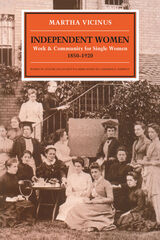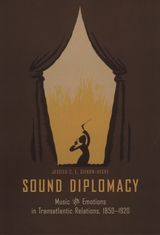4 books about 1850 - 1920

Independent Women
Work and Community for Single Women, 1850-1920
Martha Vicinus
University of Chicago Press, 1985
Martha Vicinus's subject is the middle-class English woman, the first of her sex who could afford to live on her own earnings 'outside heterosexual domesticity or church governance.' She wanted and needed to work. Meticulous, resonant, original, triumphant, Independent Women tells of the efforts and endurance of this Victorian woman; of her courage and the constraints that she rejected, accepted, and created. . . . The independent women are the 'foremothers' of any women today who seeks significant work, emotionally satisfying friendships, and a morally charged freedom."—from the Foreword by Catharine R. Stimpson
"Feminist insight combines with vast research to produce a dramatic narrative. Independent Women chronicles the energetic lives and imaginative communal structures invented by women who 'pioneered new occupations, new living conditions, and new public roles.'"—Lee R. Edwards, Ms.
"Vicinus is to be congratulated for her brave and unflinching portraits of twisted spinsters as well as stolid saints. That she stretches her net up into the '20s and covers the women's suffrage momement is a brilliant stroke, for one may see clearly how it was possible for women to mount such an enormous and successful political campaign."—Jane Marcus, Chicago Tribune Book World
"Vicinus' beautifully written book abounds in rich historical detail and in subtle psychological insights in the character of its protagonists. The author understands the complexities of the interplay between economic and social conditions, cultural values, and the aims and aspirations of individual personalities who act in history. . . . A superb achievement."—Gerda Lerner, Reviews in American History
"Martha Vicinus has with intelligence and energy paved and landscaped the road on which scholars and students of activist women all travel for many years."—Blanche Wiesen Cook, Women's Review of Books
"Independent Women can be read by anyone with an interest in women's history. But for all contemporary women, unconsciously enjoying privileges and freedoms once bought so dearly, this book should be required reading."—Catharine E. Boyd, History
"Feminist insight combines with vast research to produce a dramatic narrative. Independent Women chronicles the energetic lives and imaginative communal structures invented by women who 'pioneered new occupations, new living conditions, and new public roles.'"—Lee R. Edwards, Ms.
"Vicinus is to be congratulated for her brave and unflinching portraits of twisted spinsters as well as stolid saints. That she stretches her net up into the '20s and covers the women's suffrage momement is a brilliant stroke, for one may see clearly how it was possible for women to mount such an enormous and successful political campaign."—Jane Marcus, Chicago Tribune Book World
"Vicinus' beautifully written book abounds in rich historical detail and in subtle psychological insights in the character of its protagonists. The author understands the complexities of the interplay between economic and social conditions, cultural values, and the aims and aspirations of individual personalities who act in history. . . . A superb achievement."—Gerda Lerner, Reviews in American History
"Martha Vicinus has with intelligence and energy paved and landscaped the road on which scholars and students of activist women all travel for many years."—Blanche Wiesen Cook, Women's Review of Books
"Independent Women can be read by anyone with an interest in women's history. But for all contemporary women, unconsciously enjoying privileges and freedoms once bought so dearly, this book should be required reading."—Catharine E. Boyd, History
[more]

Long Lost Blues
Popular Blues in America, 1850-1920
Peter C. Muir
University of Illinois Press, 2010
Mamie Smith's 1920 recording of ""Crazy Blues"" is commonly thought to signify the beginning of commercial attention to blues music and culture, but by that year more than 450 other blues titles had already appeared in sheet music and on recordings. In this examination of early popular blues, Peter C. Muir traces the genre's early history and the highly creative interplay between folk and popular forms, focusing especially on the roles W. C. Handy played in both blues music and the music business.
Long Lost Blues exposes for the first time the full scope and importance of early popular blues to mainstream American culture in the early twentieth century. Closely analyzing sheet music and other print sources that have previously gone unexamined, Muir revises our understanding of the evolution and sociology of blues at its inception.
[more]

Sound Diplomacy
Music and Emotions in Transatlantic Relations, 1850-1920
Jessica C. E. Gienow-Hecht
University of Chicago Press, 2009
The German-American relationship was special long before the Cold War; it was rooted not simply in political actions, but also long-term traditions of cultural exchange that date back to the nineteenth century. Between 1850 and 1910, the United States was a rising star in the international arena, and several European nations sought to strengthen their ties to the republic by championing their own cultures in America. While France capitalized on its art and Britain on its social ties and literature, Germany promoted its particular breed of classical music.
Delving into a treasure trove of archives that document cross-cultural interactions between America and Germany, Jessica Gienow-Hecht retraces these efforts to export culture as an instrument of nongovernmental diplomacy, paying particular attention to the role of conductors, and uncovers the remarkable history of the musician as a cultural symbol of German cosmopolitanism. Considered sexually attractive and emotionally expressive, German players and conductors acted as an army of informal ambassadors for their home country, and Gienow-Hecht argues that their popularity in the United States paved the way for an emotional elective affinity that survived broken treaties and several wars and continues to the present.
[more]

The Work Ethic in Industrial America, 1850-1920
Daniel T. Rodgers
University of Chicago Press, 1978
"Rodgers's book is a study of how technology affects ideas. That is the issue to which Rodgers always returns: how did men and women react to the economy of unprecedented plenty that the 19th-century revolution in power and machines had produced? . . . This is certainly . . . one of the most refreshing and penetrating analyses of the relation of diverse levels of 19th-century culture that it has been my pleasure to read in a long time."—Carl N. Degler, Science
[more]
READERS
Browse our collection.
PUBLISHERS
See BiblioVault's publisher services.
STUDENT SERVICES
Files for college accessibility offices.
UChicago Accessibility Resources
home | accessibility | search | about | contact us
BiblioVault ® 2001 - 2024
The University of Chicago Press









